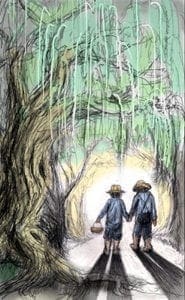Reflections at the turkey-making table
By LORRAINE V. MURRAY, Commentary | Published November 17, 2016
 “I hope we don’t run anyone over,” I confided to my mother-in-law as I steered her wheelchair into the elevator.
“I hope we don’t run anyone over,” I confided to my mother-in-law as I steered her wheelchair into the elevator.
There was a fall festival at the nursing home, complete with a face-painting station and petting zoo—and maybe because dementia has, over time, given Mom a childlike spirit, she was eager to participate.
Outside, we saw kids brushing the mane of a docile donkey, while others raced over to the bouncy castle. As I pushed her along, I pointed out purple pansies and the vivid blue sky, and she smiled.
When she grew tired, I returned her to her room, and as I was leaving, I overheard a staff member saying someone was needed to man the “turkey table.” Really, how could I pass that up?
On the table were stacks of construction-paper heads, beaks and feathers necessary to shape colorful birds. Children listened to my short tutorial (“You add the feathers this way and then you fold the beak”)—and then got to work.
One girl jotted down her blessings on the turkey, “Intelligent, pretty, smart, family.” Another one penned, “School, art, laughter, mom and dad.”
What about me? I thought. What am I grateful for this year?
Friends came to mind immediately, because during the past 15 months of widowhood they have been more precious than ever.
One friend headed over immediately when I called him because I was creeped out by a palmetto bug in the washing machine.
Another installed a home-security system, pruned the grape vines and provided free tutoring on finances.
Many friends around the globe have been praying for me, including folks in England and a priest in New Zealand.
The Old English root of the word “friend” means someone you love. And I would add someone who accepts you just as you are.
A friend has seen you in your bathrobe and fuzzy pig slippers—without makeup—and doesn’t care. Even if you inadvertently offend them with a clumsy remark, they forgive you.
Long-time companions savor a cache of treasured memories. One friend and I still fondly recall that time at the zoo when her toddler accidentally dropped his pacifier into the monkey cage.
Another friend and I laugh when we remember how her little girl referred to hamsters as “Natiuses” because my hamster was named Ignatius.
Jesus added a sacrificial element to the word “friend” when he said, “Greater love has no man than this, that a man lay down his life for his friends.”
Most of us will never actually die for someone we love—but we can help them endure their suffering.
Ecclesiastes puts it this way: “Two are better than one, because they have a good reward for their labor. If either of them falls down, one can help the other up.”
These words resonate even more since I’ve become Mom’s only local relative. You see, Jef promised God he’d visit her weekly, and I try to make good on that.
Fortunately, she still enjoys hearing me relate funny stories from the past. Like the time she dove into her swimming pool—out in the woods—and discovered a snake swimming beside her.
And the day Reuben, the basset hound, upended a pan of roast chicken—and gobbled down every morsel.
Whenever I say goodbye, I tell her I love her. “Do you love me too?” I ask. “Very much,” she replies.
Will she one day no longer understand these words? Probably. And will she stop recognizing me? Most likely.
Still, she’ll always be someone I regard with affection, someone I can help through my prayers. And just like my other friends, she’ll be counted among my blessings.
Artwork—“Returning Home”—from “Black and White Ogre Country: The Lost Tales of Hilary Tolkien,” edited by Angela Gardner and illustrated by Jef Murray. Lorraine’s email address is lorrainevmurray@yahoo.com.